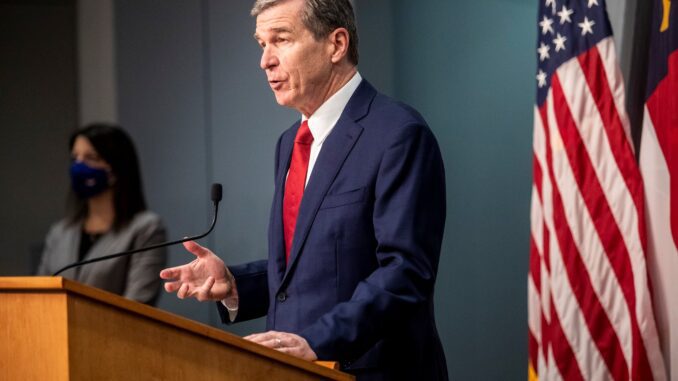
RALEIGH — Gov. Roy Cooper cited his administration’s success in handling the omicron variant of COVID-19 and said that schools and local governments should end their mask mandates at a Feb. 17 media briefing. While encouraging the entities to do so, he stopped short of issuing an order on the matter, instead continuing to defer to them on enforcement.
“We are taking a positive step on mask requirements to help us move safely toward a more normal day-to-day life,” said Gov. Cooper. “It’s time to focus on getting our children a good education and improving our schools, no matter how you feel about masks.”
As of Feb. 17, 60 school districts – more than half of the state’s 115 districts – have gone mask optional.
A proposed set of changes to the StrongSchools NC toolkit was made public, with an effective date of March 7. No clear reason was given for the choice of that date beyond continued attempts to push for citizens and children to get vaccinated.
The proposed upcoming updates to the toolkit for K-12 schools include promoting vaccinations and boosters, continuing COVID testing in schools, and “considering moving to voluntary masking at the discretion of local authorities as universal masking is a less important tool in lower risk settings like schools.”
The updates for schools also seem to link going mask-optional for students to vaccination status, stating that, “Masks are recommended in indoor settings for people at high risk for severe disease and who are not up to date on vaccines.”
Additionally, the updates say masks are “required” following a COVID infection and “recommended” after a COVID exposure.
“Because masks can add a layer of protection for those who want it, schools should support
students and staff who choose to wear a mask,” the final K-12 schools proposed toolkit update reads.
Similar updates for childcare settings were also included in the proposed March 7 toolkit changes.
Responding to a question from a media outlet, Cooper characterized the General Assembly’s activities to move forward legislation to allow parents to choose whether or not their child is masked as “frantic.”
“I know they are looking at something today and they are very frantic about it,” Cooper said when asked if he would veto the mask choice bill moving through the legislature. “From what I know about it, I have concerns that it is unwise and irresponsible. I mean, are we going to let people pick and choose which public health rules they are going to follow?”
Cooper then said he would review the bill when lawmakers pass it. And they have.
The bill is Senate Bill 173, the Free the Smiles Act. It passed the House prior to Cooper’s briefing along partisan lines by a vote of 76-42. It also passed the Senate by a vote of 28-17, with only two Democrats voting in favor; Sen. Ben Clark (D-Cumberland) and Sen. Kirk deViere (D-Cumberland).
In a press release, House Speaker Tim Moore (R-Kings Mountain) announced that the North Carolina House has passed the Free the Smiles Act “in a veto-proof, bipartisan vote of 76-42.”
“All health care decisions for our students belong with their parents, not with politicians or bureaucrats. No one cares about these children more than their parents, and no one is better-suited to make these decisions,” said Moore. He also said the action was “long overdue.”
A similar press statement came from Sen. Deanna Ballard (R-Watauga).
“Our youngest students are suffering under these mask mandates. Put yourself in their shoes and imagine how difficult your first few years of school would be if you had to wear a mask,” said Ballard, who serves as the chairwoman of the Senate Education Committee. “Giving parents the ability to choose whether their child wears a mask balances the specific needs of a family. It’s past time to give our students a lifeline and let them get back to learning freely.”
When asked what happens if local school boards don’t lift mask mandates, he said local control was “important” and legislation he signed gave them that control. He also said he thinks most of the school boards will “consider it.”
The governor was asked if there is local control, why did he feel the need to say something today and he thought places that still have mask requirements needed to “hear this from you.”
Cooper responded that over the pandemic officials and schools have looked to guidance like the toolkit but that “we’re at a point in the pandemic where the health officials say that lifting those mask mandates might be the right thing for them to do” and that “they should consider that.”
The lack of a clear statement that masks should be optional in schools by both Cooper and N.C. Department of Health and Human Services interim Secretary Kody Kinsley is similar to the governor’s inaction on reopening K-12 schools for in-person instruction in 2020 and into early 2021.
The legislature ran a bill to re-open schools which revealed a clear partisan divide as Democrats mainly voted against the bill. Once it cleared the final vote, it was sent to Cooper who vetoed the bill and in his veto message said the bill “threatens public health.” An attempt to override was unsuccessful, with Democrats in the Senate upholding the veto.
Pressure to reopen schools continued to grow, and when asked why he wasn’t going to use an executive order, Cooper said there was no order “because districts want to know what state believes” and that “we are giving them that guidance today.”
A new bill was introduced and passed and a deal was struck with Cooper. The new bill, Senate Bill 220, was very similar to the earlier reopening school bill, Senate Bill 37, however, the new version contained language preserving the governor’s powers to order closures or increased restrictions on a district-by-district basis.
The new reopening bill was announced on Mar. 10, 2021, which coincided with the one-year anniversary of Cooper’s statewide COVID state of emergency order. That emergency order is 709 days old as of today’s COVID briefing.
Over the course of the pandemic, the state’s top education official State Superintendent Catherine Truitt has consistently questioned the N.C. Department of Health and Human Services for metrics for reopening schools as well the plan for ending masking.
Heading into the 2020 fall semester, she advocated for local control in reopening for in-person instruction over the governor’s “one-size-fits-all” approach to the state’s K-12 public schools.
This week, Truitt called for an end to the StrongSchools toolkit.
“With the new changes that will be voted on in March by the SBOE, which eliminate the requirement for contact tracing, I think it’s time for the Toolkit to be something that just provides data to districts that allows them to make informed decisions,” said Truitt.
A.P. Dillon contributed to this report.



